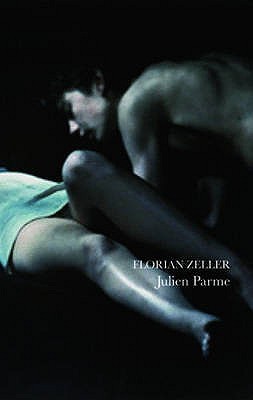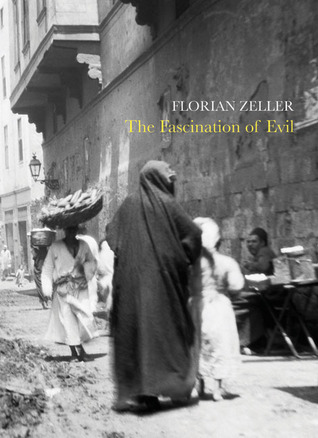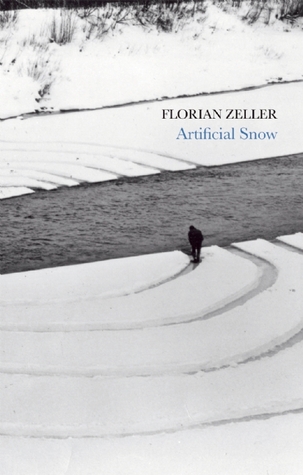Florian Zeller is an author probably best marked as ‘one for the future’, given that he is still to reach thirty, but that hasn’t stopped him in recent years putting out a number of novels and plays. Julien Parme (2006), is the fourth of his novels and provides an interesting bit of trivia in that two translations have been released this year – one in the US by Other Press, translated by William Rodarmor, and the pictured edition, in the UK, translated by Christopher Moncrieff, and published by Pushkin Press.
His previous novels, also from Pushkin Press, include Lovers Or Something Like It, a paean to a generation confounded by the abundance of choices facing them, and The Fascination Of Evil, a response to the controversy surrounding Michel Houellebecq’s Platform. Both of these demonstrated a solid style reminiscent of Milan Kundera and Houellebecq himself, the narrative veering off at tangents. So it comes as a surprise to find, with Julien Parme, a change in style.
While you were always sure that Zeller was in charge in previous novels, dripping observations across each page while recounting his characters’ adventures, Julien Parme is told completely by its title character, a fourteen year old boy who dreams of winning the Nobel Prize in Literature by the time he’s twenty. (“Julien Parme, you’ve never heard of him? The great writer? No? Really? Because I forgot to tell you I’d like to be a great writer.”)
Julien begins his account wanting “to tell you about the incredible thing that happened last year”, before going on to say something contradictory…
That sort of person has always made me want to puke. That’s why if someone says he’s got an incredible thing to tell you, I’d be more the sort to be wary, because someone who says that, you shouldn’t give him the chance to go any further. Never.
…and then going back on that (“But in my case it’s not the same, seeing it’s me who’s doing the telling…”) Zeller captures well this meandering teenage mind as it criss-crosses itself through the story, heading off on imaginative flights, usually around Julien’s future as a famous novelist, something that, given the unoriginality of his titles (The Night Ahead of Me, a take on Celine’s Journey To The End of the Night, and the more obvious A Thousand Years of Solitude).
Julien’s imagination is no doubt the sum of a having few friends and his mother’s relationship with François (“…the latest in the long line of muppets…”). When he gets caught smoking his mother grounds him, forbidding him to attend the birthday party of Émilie, older sister of Mathilde who he harbours a fancy for, even though he daren’t speak to her. But, teens being teens, Julien goes to the party anyway, and the weekend from there becomes a chain of events, some perhaps a bit unlikely, that lead up to the predicament described at the start of the story: looking back on the past year, having been sent off to a family friend in Saint-Dié.
What finished me off more than anything was the feeling that they wanted to get rid of me. My mother, then my uncle. Basically, no one wanted me under their feet. As far as they were concerned I was a hopeless case. Especially my mother; on the platform I definitely sensed she was telling herself: ‘Come on, just another little effort and that’ll be the end of the nightmare’. It freaked me out that she didn’t even look unhappy.
Where previous Zeller novels would have used the incidents in Julien’s life to wax on about topics such as romance, friendship, bravado, and more, there’s little of that here in Julien Parme. While we wouldn’t expect a fourteen year old to be spitting aphorisms left, right and centre (or good ones, at any rate) there’s little sense that, in the year since, Julien has grown at all. Being even more isolated than before, you would think, would stir up a stream of reflections on where he went wrong. But the novel tends to wallow in a straightforward account that, because the conclusion is gifted from the off, holds little surprise.
In its defence, Zeller hasn’t went the way of many writers who tackle the child narrator by giving Julien that common get-out-of-jail card: making him precocious. If anything he’s a danger to himself, unsure of the world and just beginning to get interested in its wonders, such as women:
Several minutes dragged by, while in my mind thousands of words were jostling around everywhere, trying to work out what to say. Then the moment came, and I leapt in with both feet.
“The music, it’s not bad is it?”
“You think? I don’t like it much, me.”
“Yeah, that’s true mind you, it’s not brilliant this music…It’s the kind of thing they play on the radio…”
I let it go for a moment, unsure even whether to add: “You’re right frankly, it’s useless this music. I haven’t really been listening. It’s crazy.” But I thought it best to change the subject, so I wouldn’t seem like a guy who’s easily influenced.
It’s a convincing piece of ventriloquism, the way Julien’s mind wanders, and the scrapes he bumbles into set up some interestng scenes, but it really does feel like Zeller’s taken his foot off the brake with this one. The change in style is certainly interesting and I hope that Julien Parme is a halfway house between the two as, I think, a blend of his last novel and this could push him to a larger audience. Florian Zeller, you’ve never heard of him? No? Really? But I already told you, he could be a great writer.



I guess the jury is still really out about whether Zeller will achieve greatness.
One thing that got me thinking – its interesting that Zeller managed to get ‘inside the mind’ of a 14 year old whilst totally ignoring the likes of Facebook and MySpace….Hmmmm
http://www.urbanlandfill.co.uk/2009/01/book-florian-zeller—julien-parme.html
Until he produces the goods it still will be.
I can’t say now, Russel, what I would be like were I a fourteen year old today, but I doubt that their omission matters much in the course of a single weekend. Especially when there’s a party to go to. Still, what do I know. I’m too old to think half my age. Maybe that’s just the problem for authors (and reviewers) who never had such things in their childhood to consider them a relevance.